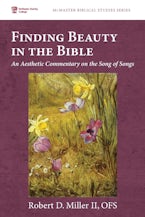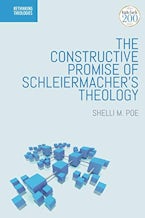- Home
- New Studies in Biblical Theology
- religion
- Finding Favour in the Sight of God

Finding Favour in the Sight of God
A Theology of Wisdom Literature
Series: New Studies in Biblical Theology
288 Pages
- Paperback
- ISBN: 9780830826476
- Published By: IVP Academic
- Published: September 2018
$25.00
Biblical wisdom literature serves as a source of both inspiration and confusion to its readers. While many Christians have drawn guidance from different passages within Proverbs, Job, and Ecclesiastes, many have also been perplexed and even discouraged by the interpretative challenges these books can present. For this reason, this reviewer believes many should avail themselves of Richard P. Belcher’s Finding Favour in the Sight of God: A Theology of Wisdom Literature.
In his newest book, Belcher offers readers the fruit of his own hermeneutical and theological reflections on the books of Proverbs, Job, and Ecclesiastes. He begins with a chapter which summarizes modern approaches to canonical wisdom literature, noting the problems faced by Old Testament (OT) theologians in their study of this corpus. Belcher advocates for a unified approach to OT theology given the various features shared by OT salvation history and wisdom literature (12–15). He then tackles the books of Proverbs, Job, and Ecclesiastes by devoting three chapters to each. In his first chapter on Proverbs, he discusses the theology of Prov 1–9 by examining the messages of the prologue (19–22), the father’s instruction (24–29), and Lady Wisdom’s speeches (29–37). Next, Belcher discusses the matter of genre, making the case that individual proverbs should be understood to be “situationally specific and not universally true” (48). He also defends the position that the proverbial material expresses a religious rather than secular message (45–46). He closes his study of Proverbs with a summary of its theology, highlighting its emphasis on God’s sovereignty (53–55), its depiction of the order with which God created the world (55–67), and its teaching regarding both present and eternal life (67–73).
Belcher’s next three chapters focus on the book of Job. He begins by exploring the theological features of Job 1–3 and observes that these opening chapters introduce two different issues: (1) the issue of whether or not Job is suffering because of his sins, and (2) the issue of how Job is responding to his suffering (86). Belcher devotes a separate chapter to the study of Job 4–26 and convincingly shows that each of Job’s friends misdiagnoses the problem because they assume a mechanical view of divine retribution (96–98). Subsequently, Belcher provides an overview of chapters 27–42 (109–27), a summary of the key theological themes of the book (127–31), and a brief exploration of the message of Job in light of the coming of Christ (131–32).
Ecclesiastes is the subject of the penultimate section of Belcher’s book. He prepares readers for his approach by devoting a chapter to the various interpretative issues involved in studying Ecclesiastes. Importantly, Belcher argues that Ecclesiastes is a framed autobiography: the words of Qohelet (1:12–12:7) are enveloped between a prologue (1:1–11) and an epilogue (12:8–14), which were added by a separate hand as an evaluation of Qohelet’s perspective (135–36). As such, Belcher believes that the book of Ecclesiastes as a whole functions as a warning against the dangers of speculative wisdom which are put on display by the musings of Qohelet (145). In the following chapter, Belcher argues that Qohelet’s worldview is contrary to the perspective of Proverbs and to the OT as a whole. According to Belcher’s reading, Qohelet presents a bleak view of human existence as he denies the profit of all labor (149–52), casts doubt on the goodness and righteousness of God (153–56), and emphasizes the severe limits of human knowledge (161–67). Qohelet ultimately rejects the two-ways teaching of the OT (163) as he denies the notion of divine retribution (166–67) and views death as the final end for all (169). Belcher closes his reflections on Ecclesiastes by contrasting the theology of Qohelet with the theology of the book in its final form. According to Belcher, the addition of the prologue and epilogue show that the book of Ecclesiastes was intended to serve as a warning against the dangers of speculative wisdom modeled by Qohelet. As he states, “The book of Ecclesiastes sets forth Qohelet’s ‘under the sun’ struggle to show the danger of speculative, doubting wisdom and to remind God’s people of the true foundation of wisdom: a reverent trust in God and his revelation” (186).
Belcher concludes his book with a discussion on the relationship between Jesus and wisdom. He explores how the coming of the kingdom impacted Jesus’ use of proverbial material, and he convincingly shows that differences between Jesus and the wisdom teaching of the OT are due to a salvation-historical shift rather than to any actual contradictions (199–201). He also casts some doubt on the promise of wisdom Christology, as he critiques the claims that various NT passages borrow from Jewish discussions of hypostasized wisdom (204–12). Instead of equating Christ with wisdom, Belcher argues that the NT author’s affirmed Christ’s supremacy over wisdom (204–10). Thus, while the Christology of the NT may indirectly reflect OT teaching regarding Lady Wisdom, Belcher denies that the apostles understand Jesus to be the hypostasis of wisdom (which is consistent with his earlier comments on Prov 8; see 37–38).
Overall, Belcher has done a fine job of writing a guide to wisdom literature that is both learned and accessible. Some readers may be disappointed in his limited engagement with questions of authorship and of historical backgrounds; however, these sorts of questions lie somewhat beyond the purpose of the work. While some of his suggestions would have been helped by further argumentation (e.g., his claim that Qohelet is to be distinguished from the author of Ecclesiastes), Belcher’s observations are always clearly stated and worth thoughtful consideration. Additionally, Belcher does not content himself with theoretical discussions regarding the nature of wisdom literature; instead, he assists readers to reflect on how this particular corpus can help them live lives marked by wisdom. One proverb famously says, “Whoever walks with the wise becomes wise, but the companion of fools will suffer harm” (Prov 13:20, ESV). I warmly commend Finding Favour in the Sight of God as a wise companion that will benefit anyone who chooses to stroll through its pages.
Richard M. Blaylock is Adjunct Instructor of New Testament Interpretation and a doctoral candidate at Southern Baptist Theological Seminary.
Richard M. BlaylockDate Of Review:June 18, 2019
Richard P. Belcher Jr. is John D. and Frances M. Gwin Professor of Old Testament and Academic Dean at Reformed Theological Seminary in Charlotte, North Carolina. His books include Job: The Mystery of Suffering and God's Sovereignty, Ecclesiastes: A Mentor Commentary, and Prophet, Priest, and King. He is a contributor to IVP’s Dictionary of the Old Testament: Wisdom, Writings and Poetry.











